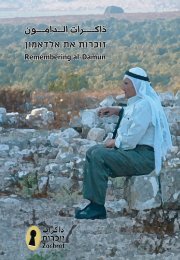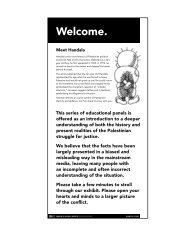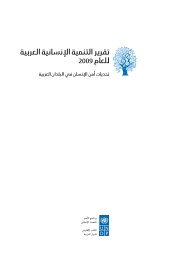arab human development report 2003 - Palestine Remembered
arab human development report 2003 - Palestine Remembered
arab human development report 2003 - Palestine Remembered
- No tags were found...
You also want an ePaper? Increase the reach of your titles
YUMPU automatically turns print PDFs into web optimized ePapers that Google loves.
level of <strong>development</strong>, help all its citizens togrow and flourish and take its proper place onthe 21st century global stage.The Report examines the status of Arabknowledge today in terms of demand, productionand dissemination, and concludes that allthree are ineffectual notwithstanding theabundance of Arab <strong>human</strong> capital. It contraststhis state with the origins and outcomes of theregion’s rich, enquiring and pluralistic culturaland intellectual heritage, confirming that thelatter provide robust foundations on which tobuild a knowledge society. It however observesthat the positive models found in Arabculture lack effective economic social, and politicalequivalents. The missing links are eitherburied in dust or smothered by ideologies, societalstructures and values that inhibit criticalthinking, cut Arabs off from their knowledgerichheritage and block the free flow of ideasand learning.There is therefore a pressing need fordeep-seated reform in the organisational, socialand political context of knowledge. TheReport identifies several key priorities forchange. An important set of findings is that, increating an Arab knowledge society, the reformof governance would represent a turningpoint, the renewal of education and the Arabiclanguage a rallying point and the pursuit ofcultural interaction an international meetingpoint.The Report proposes a strategic visionthat could support a creative Arab renaissancebuttressed by five essential pillars:• Providing and guaranteeing the key freedomsof opinion, expression and associationthrough good governance.• Broadening quality education and makingit available to all.• Embedding science in Arab society,broadening the capacity for research and <strong>development</strong>and joining the information revolutiondecisively.• Shifting rapidly towards knowledge-basedand higher value-added production.• Developing an enlightened Arab knowledgemodel that encourages cognitive learning,critical thinking, problem solving andcreativity while promoting the Arabic language,cultural diversity and openness to othercultures.Undoubtedly, certain arguments in theReport might seem controversial and may beappreciated only after a conscientious reappraisal.Yet the Report claims neither infallibilitynor a monopoly of the truth. Its authorswill be satisfied if it prompts open dialogue,constructive criticism, disagreement supportedby evidence and consent strengthenedby proof. Such responses would expedite thequest for common goals and the Arab journeyto knowledge and freedom.AHDR <strong>2003</strong> represents a substantial intellectualendeavour in the region to which manypeople have contributed. I am deeply thankfulto all who participated in its preparation,review and editing. I am especially grateful tothe core team, particularly the lead author, Dr.Nader Fergany, for his resourceful involvementat all stages. My sincere thanks also go tothe Advisory Board without whose counselthis Report would not have been possible.Finally, I am indebted to Mark MallochBrown, Administrator of UNDP, for his continuedbrave support to this series, and to ourco-sponsors, the Arab Fund for Economic andSocial Development, for their sustained collaboration.Rima Khalaf HunaidiAssistant Secretary General and Assistant Administrator, Regional Director,Regional Bureau for Arab States, United Nations Development ProgrammeIV







